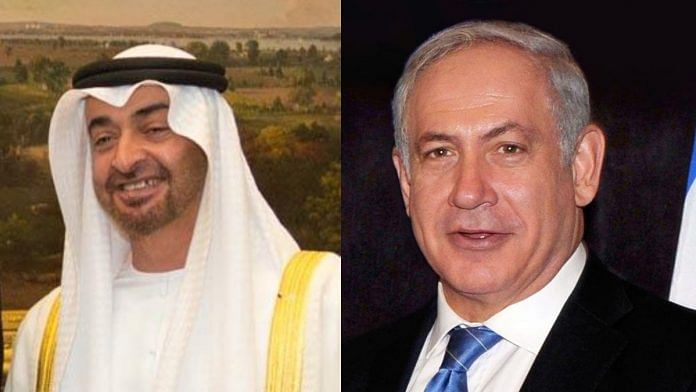For President Donald Trump’s critics and supporters of Palestinian nationalism, there will be a temptation to spin today’s historic normalization agreement between Israel and the United Arab Emirates as a setback for Israeli Prime Minister Benjamin Netanyahu.
Following the announcement of Trump’s Middle East peace plan earlier this year, Netanyahu began the process of annexing parts of the West Bank, a process he said the plan authorized. The White House urged him to reconsider. He pressed on.
Now it is revealed that, as part of the agreement with the UAE, Israel has agreed to “suspend declaring sovereignty” over areas outlined in Trump’s January plan. Netanyahu later said he remains “committed” to annexation, but the joint statement about today’s agreement says that Israel will “focus its efforts now on expanding ties with other countries in the Arab and Muslim world.”
In a sense, this is a concession to both the White House and to America’s Arab allies, which saw annexation as Israel’s way of setting the borders of a future Palestinian state and dooming a two-state solution. But in a more important sense, this “concession” is a fig leaf.
For the Gulf States in particular, normalization of ties with Israel has historically been tied to the full withdrawal of forces to the pre-1967 lines and recognition of a Palestinian State. These principles were affirmed almost two decades ago through something known as the Arab Peace Initiative. The UAE had previously endorsed that initiative. Now the UAE and Israel have agreed to sign agreements to establish reciprocal embassies in their countries without any agreement for Israel to remove its forces from the West Bank.
The UAE is not the first Arab country to formally recognize Israel. Egypt signed the Camp David Accords in 1979 in return for the Sinai, while Jordan signed its agreement in 1994 at the height of the Oslo Peace Process. It’s notable that the UAE has signed its agreement with Israel when there are no peace negotiations whatsoever.
And that is the most striking element of the normalization agreement. It reflects two realities of today’s Middle East: First, Israel and most Gulf states have been quietly cooperating for the past 20 years. The Israelis and the Emiratis in particular have shared intelligence and private diplomatic initiatives to roll back Iranian influence in the region.
The other important reality is that no one in the Middle East can say with a straight face that Israel is the source of the region’s instability. Experience is a cruel teacher. Israel had nothing to do with the collapse of the U.N.-recognized government in Yemen — the Iranian-supported Houthis did. Israel had nothing to do with the collapse of Syria — that was the fault of the country’s dictator, Bashar al-Assad. And Israel had nothing to do with the rise of Islamic State in Syria and Iraq. In all of these cases, the regimes and groups most vocally opposed to Israel also served as the region’s chief arsonists.
This is something Arab leaders in the region understand better than many advocates for Palestinian sovereignty in the West. As Osama bin Laden once observed, “When people see a strong horse and a weak horse, by nature they will like the strong horse.” In assessing the region, the UAE’s leaders have seen one state thrive as its neighbors burned. They have chosen the strong horse. – Bloomberg
Also read: This is what Israel, UAE and US get from the diplomatic breakthrough in Middle East




Israel and United Arab Emirates conclude a historic peace deal on 13 August 2020.
According to news reports , Israel and UAE have concluded a peace deal on 13 August , 2020 with the leading role of US President , Donald Trump. As part of the agreement , Israel will suspend declaring sovereignty over areas outlined in the Trump Administration’s Mideast peace plan , adding the country would focus on expanding ties with other countries in the Arab and Muslim world. A phenomenal and hard-nut-to-crack accomplishment , it is expected to assume significance in November 2020 US Presidential election , giving some credit to President Donald Trump. The said scenario in the U.S. can be found to be corresponding to one of key predictions of this Vedic astrology writer in article – “ Astrological probable alerts for 2020” – made last year 2019 on 11 November. The article was published at wisdom-magazine.com/Article.aspx/5176/ on 1 January , 2020. The text in the article related to the prediction reads as follows :-
“ 5. The second half of the year 2020 from July to November seems to be introducing some kind of relief , can be described as a change of season. Projects or plans left over from the past could gain a positive direction towards success………………………………………………..SOME PARTS OF AUGUST AND SEPTEMBER CAN BE SPECTACULARLY SIGNIFICANT AS REGARDS COOPERATION OR PARTNERSHIP WITH SOME POWERFUL NATIONS. SOME MEANINGFUL AND NOTABLE AS WELL DEAL MAY BE CLINCHED. THE SECOND HALF OF 2020 SEEMS TO BE BOOSTING UP THE PROSPECTS OF EXISTING POLITICAL RULER OF THE COUNTRY”.
Sir, the picture you have posted with this article is of King Salman-the crown prince of Saudi and not UAE
Please correct the pic. The photo is of Mohammed bin Salman, he is crown prince of Saudi Arabia not UAE.
Dear Print,
What makes you quote Bin Laden and try to show him in light of wisdom?